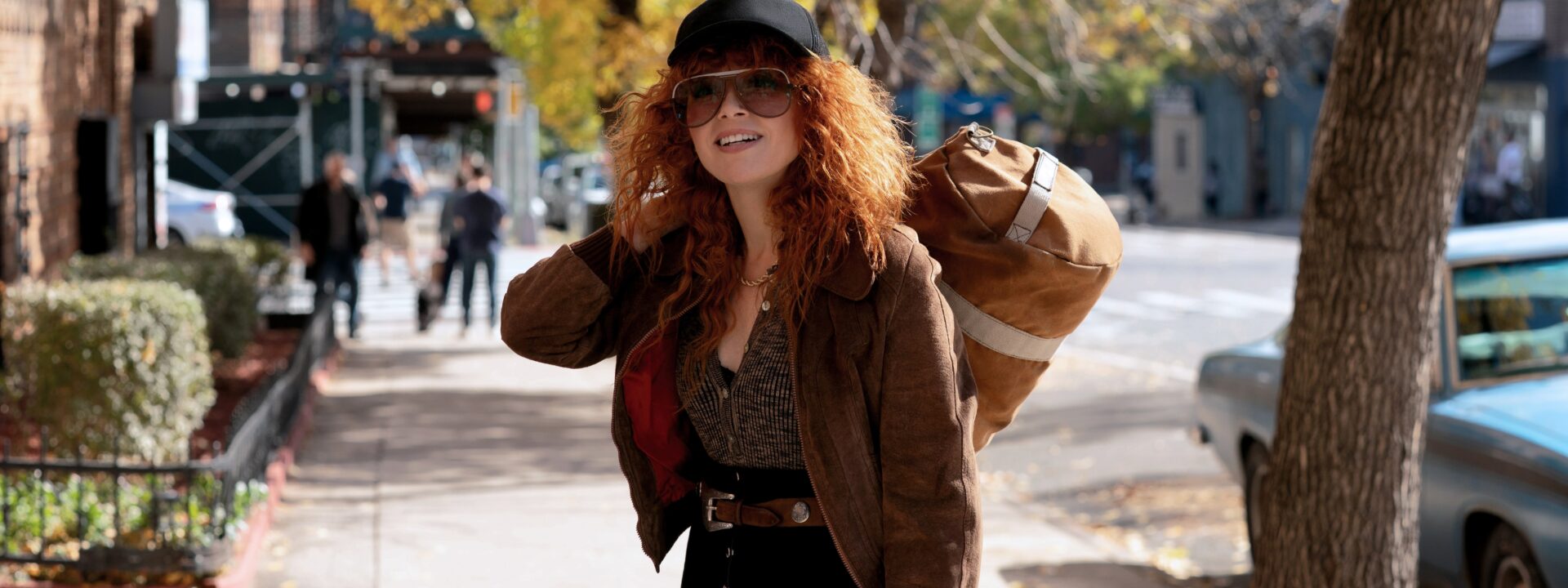I can hear Natasha Lyonne before I even see her. “This might be the craziest jacket I’ve ever worn,” she calls out in her signature New York rasp, her voice cutting through the noise on the Poker Face set. “I look like an Oompa Loompa mixed with Ray Liotta in Goodfellas—all because of the starch!”
It’s a damp November afternoon, and Lyonne is filming the eighth episode of Poker Face‘s second season alongside John Cho on a massive Brooklyn soundstage. Between takes, she jokes about the prop money not fanning out the way she wanted. “They don’t have the right flutter,” she says. From his director’s chair, showrunner Tony Tost observes that Lyonne “thinks like a director”—which makes sense, given her hands-on role in the show as an executive producer, writer, and director.
Created with Knives Out mastermind Rian Johnson, Poker Face is a weekly mystery series in the vein of Columbo, with Lyonne playing Charlie Cale, a woman whose knack for detecting lies constantly lands her in hot water. Last season ended with Charlie solving her best friend’s murder and escaping a casino boss (Adrien Brody) who wanted her dead. This season keeps the case-of-the-week format, pitting Charlie against villains ranging from an evil quintuplet to a devious child—all while dodging a crime syndicate called the Five Families.
When we first meet, Lyonne is lounging in her dressing room, legs stretched out on the table, vaping and talking a mile a minute about everything from Neuralink to Nora Ephron. (Her rapid-fire references impress everyone—even her longtime friend Clea DuVall tells Vogue, “Her mind works so fast, and it’s only gotten sharper with age. She comes up with things that leave you stunned.”) When asked about the episode she’s filming with Cho, Lyonne lights up: “It’s one of the best of the season—very David Mamet, like The Spanish Prisoner. Rian and I both love Ricky Jay. Who doesn’t? Only a crazy person,” she adds, before a quiet, “R.I.P.”
This season, Lyonne is digging deeper into Charlie’s emotional journey. “Rian and I talked about how she’s been on the run for a while now, completely isolated because the mob’s after her,” she explains. “That changes a person. I’ve thought about how many cases she’s solved off-screen between seasons and what that does to someone.”
While Charlie remains a lone wolf, Lyonne and Johnson are giving her a little more stability this time. “She’s not the type to hide away,” Lyonne says. “She loves life, loves people, wants friends—she thrives in the mix.”
In reality, Poker Face has become a reunion for Lyonne and her closest friends. This season, she brought in pals like John Mulaney, Katie Holmes, Cynthia Erivo, and Melanie Lynskey for guest roles. She even gave DuVall—who played her sister in Season 1—the chance to direct an episode.Here’s the rewritten text in fluent, natural English:
—
Two.
“What makes Natasha truly special is how much she wants the people around her to succeed,” DuVall says. “I was nervous because I love the show so much—but I also love Natasha, and I wanted to do right by her. She was incredibly supportive and amazing.”
Lyonne often dives deep into the philosophical with her work. Russian Doll led her to explore “futurism, quantum physics, spirituality, philosophy, theology, recovery, mental health, trauma, friendship, nightlife, addiction, good times, jokes, sex, rock and roll—all of that.” Poker Face is no different. “Both characters—Charlie and Nadia from Russian Doll—are rooted in Elliott Gould’s performance as Philip Marlowe in Robert Altman’s The Long Goodbye,” she explains.
It’s that desire to dig deeper that makes Poker Face so engaging. The show captures both the loneliness of the social media age and its remedies. “I think it’s true that none of us really know how to navigate this new world. We feel isolated, constantly witnessing horrors from afar,” she says. “What’s interesting about this show is the idea of small, quiet acts of kindness—things no one else needs to see.”
As always, she finds comfort in the philosophy of goodness. “One plus one always equals two. Karma is just math,” she says. “Charlie might not be able to save the world, but she can help one good person who doesn’t have a voice.”
—
The meaning remains intact while making the language more natural and fluid. Let me know if you’d like any further refinements!
